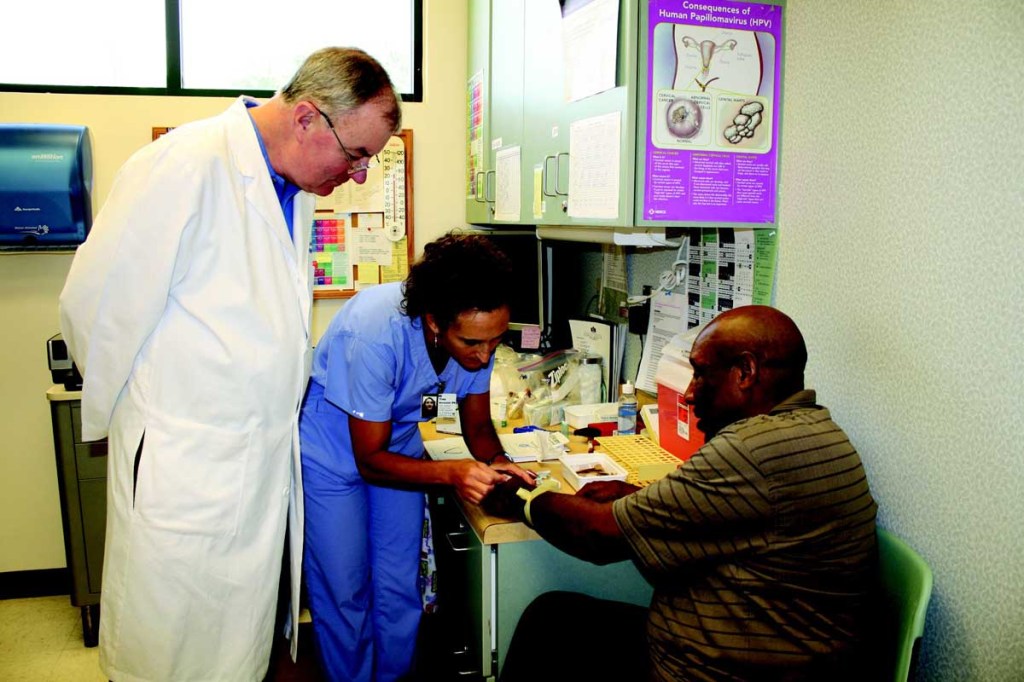Gardendale Doctor talks Men’s Health Month
Published 8:15 am Friday, June 10, 2011

- Dr. Thomas Moody and a Choctaw County Health Department nurse perform a free screening on a man at a free health clinic recently. Moody, who practices in Gardendale and Homewood, and his group Urology Centers of Alabama P.C., give free health screenings for men several times a year.
June is Men’s Health Month, and at least one Gardendale doctor is doing everything he can to increase awareness and participation by men to be more proactive about their own health.
“We want to emphasize overall health for men,” said Dr. Thomas Moody. “Men basically just don’t want to go to the doctor.”
Moody belongs to the group Urology Centers of Alabama P.C. (UCA) and practices in Gardendale on Mondays and Wednesdays. The group has 16 physicians with offices in 10 locations.
Despite many men’s reluctance to go to the doctor, Moody said annual exams can help physicians catch serious problems, such as prostate cancer, early while they are still treatable.
“If you wait until you feel bad, it’s usually too late,” Moody said, especially with prostate cancer. He said the early stages of that cancer have no symptoms.
“One of our biggest thrusts has been prostate cancer,” Moody said, adding that Alabama has the third highest rate of death from prostate cancer in the nation. “We think a lot of that has been because of failure to (go to the doctor) for early detection.”
Moody said the prostate, a gland in the male reproductive system, is affected by the same things that affect the heart, such as body weight and diet.
“If it’s good for the heart, it’s good for the prostate,” he said.
That interconnectedness is key, Moody said, in order to get a better understanding of an individual’s health.
For that reason, Moody and other physicians with UCA team up with county health departments to host free health screenings for men.
Since 2006, the doctors have screened more than 3,000 men at free clinics in 16 counties.
Up until now, the physicians have done only prostrate screenings at the clinics. But Moody said they are soon expanding their screenings to also check blood pressure and height and weight in order to determine individuals’ body mass index.
“We want to emphasize overall health for men,” he said.
Most of the clinics are held in rural areas where income is often low and people tend to not have medical insurance.
“We wanted to go where the need was greatest,” Moody said.
The clinics are free for men. Moody said many of them are afraid the first time they attend, because they do not know what to expect. But they usually find that the exam is not nearly as bad as they thought it would be, Moody said, and they will often bring a friend the next year.
That makes Moody and the other physicians happy. “The men that we see are incredibly appreciative,” he said.
At one of the clinics, a health department nurse asked Moody an important question: “What are you going to do if you find something in one of the men? You can’t just find a problem and then leave them high and dry.”
Moody’s response was, “Well, we’ll just treat them.”
UCA has an agreement with at least two Birmingham hospitals that will let men from the clinics stay there for free if Moody and his group will treat them for free.
Prostate cancer is the group’s main concern (one in six Caucasian men will get prostate cancer, and one in four African American men), but they are also watchful for other issues dangerous to men such as low testosterone, obesity, heart problems and others.
Moody urges men, especially in June for Men’s Health Month, to get their annual exams. He said it not only has physical benefits, but also economical (being sick costs a lot of money) and social (if you’re sick, you can’t work or do your normal activities).
“It’s ingrained psychologically in women to get checked every year. It’s not ingrained in men,” he said. “Men need to be proactive, not reactive. Do it for your families.”





